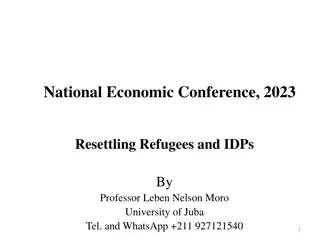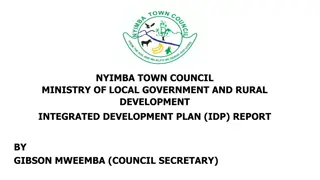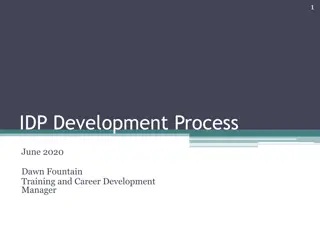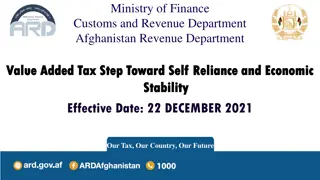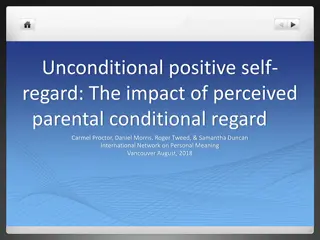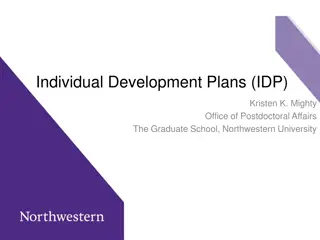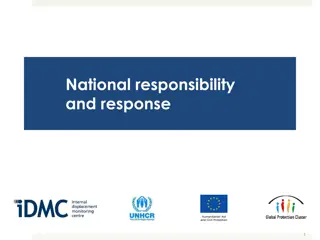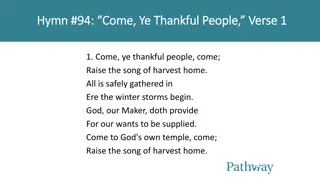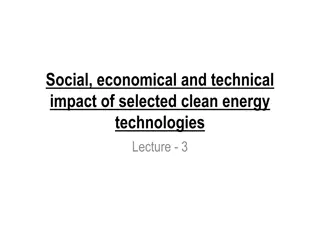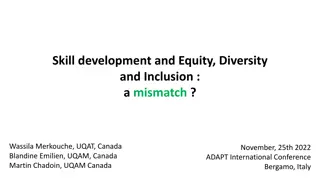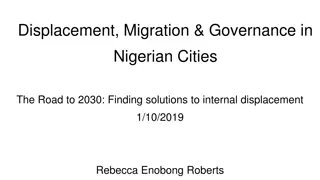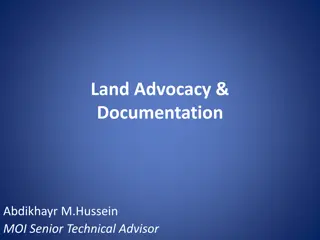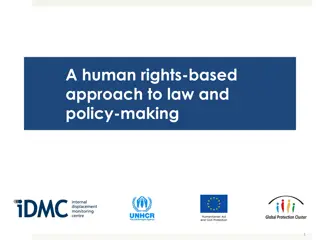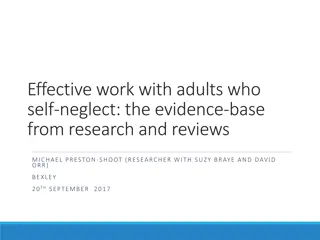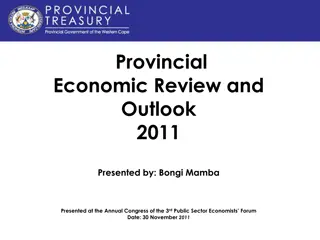Empowering IDPs Through Skill Acquisition for Self-Reliance & Economic Growth
Development is a multidimensional process challenging mankind to adapt and achieve enhanced welfare. Skill acquisition provides a platform for individuals to reach their full potential, fostering self-reliance. Challenges such as illiteracy, unemployment, and insecurity in Nigeria, particularly in Borno State, highlight the critical need for empowering internally displaced persons (IDPs) through skill acquisition to combat poverty and foster economic growth.
Download Presentation

Please find below an Image/Link to download the presentation.
The content on the website is provided AS IS for your information and personal use only. It may not be sold, licensed, or shared on other websites without obtaining consent from the author. Download presentation by click this link. If you encounter any issues during the download, it is possible that the publisher has removed the file from their server.
E N D
Presentation Transcript
Empowering IDPs Through Skill Acquisition for self-Reliance & Economic Growth
Presentation Outline INTRODUCTION SKILL ACQUISITION FOR SELF RELIANCE & ECONOMIC GROWTH KEY ISSUES FOR BORNO STATE Skill Acquisition CONCLUSION
INTRODUCTION Development is a multi-dimensional process, in constant flux challenging mankind, to adapt and adjust to the prevailing circumstances aimed at achieving enhanced welfare and overall happiness. Organizing efforts to achieve desired objectives, constitute the basis for development, punctuating the advanced and developing nations dichotomy. Irrespective of status, skill acquisition provides a solid platform from which people can develop and reach their full human potential. Once people posses a sustainable surplus they can turn their attention to the pursuit self actualization. Developing and expressing talents, skills, emotions and values to the fullest extent. It is hard to reach our full potential when we are worried about our next meal typical of IDP situation. Therefore, economic self reliance arises from two sources: 1) our efforts, talents and skills & 2) our relationship with family, friends, governments and macro social system.
Introd. Cont The macro social system is embroil with series of challenges emanating from illiteracy, unemployment, ethnic jingoism, as well as regional and religious chauvinism challenging political stability of the nation. This trend is to large extent, responsible for the security, and other socio economic challenges in most developing countries and Nigeria in particular.
Introd. Cont Nigeria in recent years is beset by growing insecurity and legitimacy crisis due to bad governance, rising inequality, endemic corruption and social exclusion which fostered the growth of radical extremist groups in the North East (Umara and Garba:2012). Herdsmen/ farmers clashes and armed banditry in the North West and North central; the secessionist political decorum in the South East and South West as well as the Niger Delta militancy in the South-South geo political zones have all reinforces national security dilemma. Yet the underline circumstances are economic deprivation accentuated by poverty, unemployment and illiteracy.
Introd. Cont Borno State of Nigeria along this line, experience the worst humanitarian crisis owing to the activities of Boko Haram Insurgency. It is estimated that more than 50.2 percent of the population were living below poverty line even before insurgency (Walker: 2012). Similarly, a report by a world bank revealed that the North East has the highest rate of poverty ranging from 54.9 to 72.2 percent. More than 70 percent of the rural poor fall within the age category of 25 years and above. Thus, the region is one of the poorest regions of the world (World Bank Report: 2013). Exercibation of the already fragile situation by Boko Haram has created very serious humanitarian crisis.
Introd. Cont Boko Haram attacks since 2009 have internally displaced an estimated 2 million people in the region. The displaced are mainly from Borno state with 62 percent of IDPs. A rapid assessment mission by the UN Office for the Coordination of Humanitarian Affairs (OCHA) estimates half of the population of 12 million living in Borno, Adamawa and Yobe are directly affected by the ongoing violence. The attacks by the insurgents continue to cause death, displacements, destruction of livelihood and violations of human rights (Umara and Mustapha: 2015). However the last quarter of 2020 accentuated dramatic improvement in the security situation and ever since the state government, has commenced the voluntary relocation of the displaced people to their original places pf abode. The construction of over four thousand Three Hundred houses to the IDPs is a giant stride as their continued reliance on aid is no longer feasible as observed by the Executive Governor of the state, Professor Baba Gana Umara Zulum, that the hand out from the government and development partners are no longer sustainable and therefore these IDPs need to be relocated and enabling environment most be provided for them to develop their talents and make them contribute their quota.
Skill acquisition for Self-Reliance & Economic Growth Relocation of IDPs back to their original places of abode should be backed by their ability to fend for themselves by reactivating their talents and skills. However, with a complete loss on means of livelihood, these people need a special intervention for their empowerment. Empowerment is a process of supporting individuals and groups to achieve or realize what they wanted to achieve. It is both institutional and otherwise, but is generally revolving around human capital development. The IDPs in Borno state cut across various age grades who are mostly productive before their displacement. They are survivors of better and traumatic experience, and therefore their empowerment should be two folds. Socio-psychological and socio-economic.
Cont. Socio-psychological, centered around dialogue and mediation for these peoples to talk to one another with a view to understanding the real situation, devoid of misgivings, poor and misconceived narratives and ordinary speculations. The IDPs as it is are divided into three: The escapees, the returnees and the remainees, each with different life threatening misgivings which, need to be ironed out or else it would spark another problem. This is particularly very certain in predominantly nomadic and border communities from within.
Cont. The socio economic empowerment on the other hand focuses on training and retraining of individuals with new or improved skills acquisitions which might not necessarily be restricted to IDPs alone. Skill acquisition is the Art of learning to do something in order to earn a living and or to survive. There are different types of professionals such as mechanics, potters, vulcanizes, beverage and soft drink makers, carpentry and furniture makers, black smiths and so on. From whom one can learn a trade. Learning skills help improve quality of life and thereby improve overall safety net.
Cont. Cognitive skills, which encompass the ability to understand complex ideas, adapt effectively to the environment, learn from experience, and reason. Foundational literacy and numeracy as well as creativity, critical thinking, and problem-solving. Socio-emotional skills, which describe the ability to navigate interpersonal and social situations effectively, and include leadership, teamwork, self-control, and grit. Technical skills, which refer to the acquired knowledge, expertise, and interactions needed to perform a specific task, including the mastery of required materials, tools, or technologies. Digital skills, which are cross-cutting and draw on all of the above skills, and describe the ability to access, manage, understand, integrate, communicate, evaluate, and create information safely and appropriately.
Cont. The development of skills can contribute to structural transformation and economic growth by enhancing employability and labor productivity and helping communities to become more competitive. Investment in a high-quality workforce can create a virtuous cycle, where relevant and quality skills enable productivity growth and foreign direct investment, which result in more and better jobs for the current workforce and more public and private investment in the education and training system. This, in turn, increases the employability and productivity for both the current and future workforce.
KEY ISSUES FOR BORNO STATE Empowerment of IDPs through skills acquisition for sustainable development Includes among other things: Resuscitation of Agricultural activities such as farming, both irrigation and rain fed, fishing and pastoralism. 1. The agricultural-cum-economic activities are conjoined to facilitate socio economic activates providing means of livelihood to more than 90 percent of the citizens. 2. Material support in form of takeoff grants, interest free loans and palliatives to our farmers, merchants and transporters would help reactivate their skills and reinforces their sense of belonging. 3. Business and commercial activates has long preoccupied our people for centuries and is still thriving across nations, regions, states and communities. They know specific market days for each community with its commodities including livestock and manufactures. 4.
Skill Acquisition Skill is the learned ability to perform an action with determined result with good execution often within a given amount of time, energy or both. Skills can often be divided into domains-general and domain specific skills. Investments in skills development through vocational training have high returns. The IDPs in Borno state are very grateful to the state and federal governments as well as the development partners for their roles in training them to acquire skills. The skills acquired by the IDP has proven the potency of Vocational Training centers and Technical schools across the state.
Cont. perceptions of the vocational track being a second-best option compared to general secondary or tertiary education is now challenged. Relevance. Technical and vocational education and training which can last anywhere from six months to three years can give young people, especially women, the skills to compete for better paying jobs. Nevertheless, more needs to be done in terms of engaging local employers to ensure that the curriculum and delivery of these programs responds to labor market needs. Efficiency. Challenges related to governance, financing, and quality assurance also impact the efficiency of skills development programs. The resulting unnecessarily high costs can limit opportunities for disadvantaged IDPs to access these programs.
Cont. The good news is that the evidence on what works and what does not in skills development, and for whom, is growing. Therefore, the state and the central governments should focus on developing production and distribution chains for the goods already produced by the IDPs Skill acquisition that empowered the IDPs includes: Animal Fattening, Fishery, Poultry, soap, detergent and liquid soap making, Tailoring, Catering, shoe and lather works, cash and food crop production and marketing, Bricks and Block making, Vulcanizing, Furniture and wood works, Auto mechanics, bricklaying, interlock brick making, soft drink and beverage making, hand-set repairs, tailoring, yogurt production, bakery and snack making, seed production and preservation, chicken dressing and preservation as well as modern fish smoking among others.
Concluding Remark the empowerment of these IDPs when in Camp has to be sustained after their relocation. This would enable them to focus on new method and perhaps even to catch up with the urban dwellers in terms of skills and productivity which could in turn mitigate rural urban migration. The socio-psychological and socio economic skill empowerment would overtime change the narratives and we recommend governments and private sectors to focus more on transforming the educational sectors to be responsive. This entails the proliferation of many polytechnics, Monotechnics and technical schools across the country, to produce highly skilled and competitive manpower to work in both public and private sector organizations. The skillful workforce do not necessarily seek job, rather they create job and employ others and this could relief the government from unnecessary manipulation of ethnic and religious differences which create dissent against the state and government and therefore pave a way for peaceful, prosperous and orderly Nigeria. Thank you for listening,



